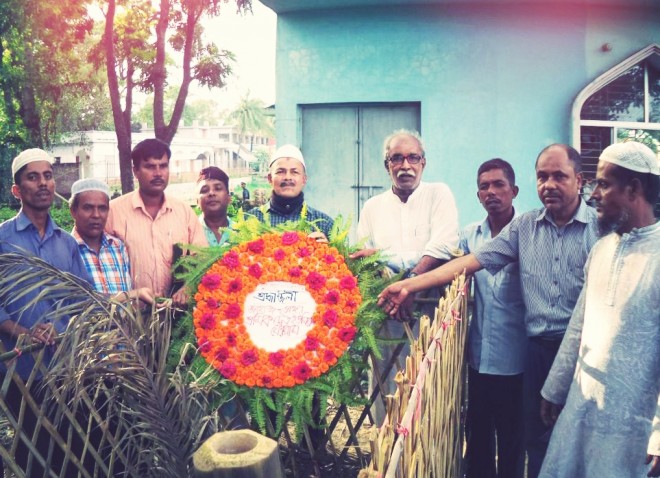Platform News – Surge of fatal accidents in Chittagong
10 shipbreaking workers killed or severely injured in one month only
At least five shipbreaking workers have been killed and five more severely injured in a series of fatal accidents in Bangladesh in one month only. On 23 May, 21-year old Rubel died at Seiko Steel shipbreaking yard when he fell from great heights. He was working without safety equipment. Only six days later, on 29 May, 5 workers were struck by falling steel plates at the same yard which is also referred to as Darussalam or Madina Enterprise. One worker died on the spot, another in hospital. The three remaining workers were severely injured. In a third accident on 5 June at Laskar Shipbreaking, 35-year old Babul was crushed by a falling steel plate. On 19 June, two workers fell victim to a cylinder blast at Bhatiary Steel shipbreaking yard. One of the workers, Swapan, died in hospital three days later, while Mayching suffers from severe burn wounds in his face and upper body. He is struggling for his life. On 23 June, Samesh suffered severe injuries from a fall at Kabir Steel, a yard that was in the headlines in April after Kabir’s private security personnel shot at workers and locals protesting a fatal accident.

As documented by the NGO Shipbreaking Platform before, European-owned vessels are often involved in these accidents. The two accidents at Seiko Steel occurred while the workers dismantled the German-owned vessel Renate N. (IMO 9006851). The demolition of the ship, whose last beneficial owner was the Hamburg-based Neu Seeschifffahrt, cost the life of three workers, and severely injured three additional workers. German shipping companies, except for industry leader Hapag Lloyd, are known to show little interest in the negative environmental and social impact of their shipbreaking practices. They simply sell their end-of-life vessels to beaching yards, including the worst in Bangladesh, with the help of cash buyers.
Recently, representatives of the International Maritime Organisation (IMO), which is implementing a NORAD-funded project in Bangladesh to improve conditions in the shipbreaking yards, presented their work on assessing the social and economic impacts of the industry in Chittagong. Bangladesh members of the Platform assisted the presentation and are concerned that human rights abuses and pollution caused by the shipbreaking industry will be side-lined in the NORAD-funded study.

The series of fatal accidents have sparked local resistance. On 10 June, the Shipbreaking Workers Trade Union Forum together with the Bangladesh Institute for Labour Studies (BILS) organised a human chain in Sitakunda, the shipbreaking area, to protest the recent deaths. BILS and the trade unionists met with the victims’ families and visited the graves of workers recently killed in shipbreaking. The Shipbreaking Workers Trade Union Forum also handed over a letter to the president of the Bangladesh Shipbreakers Association (BSBA) demanding proper investigation and the payment of compensation owed to the families of dead workers and those workers who suffered from injuries.
The Platform calls on the Government of Bangladesh to investigate these accidents and to sanction yards with regular fatal and severe accidents, such as Kabir Steel and Seiko Steel. Moreover, the Platform demands that European ship owners stop selling their end-of-life vessels to the beaching yards of Bangladesh. It is not acceptable to turn a blind eye on the precarious situation for the sake of maximum profit – European ship owners are fully aware of the dire conditions in Chittagong and more sustainable alternatives to the beaching method exist.

© BILS – Trade unionists visit grave of killed worker
Related news

Platform News – Prison sentence for attempted illegal export of the Harrier reveals reckless actions by all parties involved
The judgment, now available in English, provides shocking insights into the role played by all parties involved in the sale and transport of the end-of-life vessel.
... Read More
Press Release – The hypocrisy of better beaches: winners of the “Public Eye Investigation Award” shed light on shipbreaking in Alang and Swiss companies’ involvement
Gie Goris and Nicola Mulinaris received Public Eye’s “Investigation Award”.
... Read More
Press Release – Brazil must allow its own toxic aircraft carrier to dock
NGOs demand urgent action of Lula administration as ship needs repair and safe harbour.
... Read More
Press Release – Danish opposition parties call on Government to stop beaching of Maersk vessels
The Danish Environment Minister, Esben Lunde Larsen, had to answer to the Parliament yesterday following questions put to the Government by all the opposition parties. The… Read More

Platform publishes South Asia Quarterly Update #14
There were a total of 227 ships broken in the third quarter of 2017. Of these, 124 ships ended up on beaches in South Asia for dirty… Read More

Press Release – Two fatal accidents at Indian yards under EU scrutiny
Two separate accidents took place at well-known scrapping yards that have applied to be included in the EU list of approved ship recycling facilities.
... Read More
Platform News – ECSA’s Alang report turns a blind eye on problems of beaching method
The European Community Shipowners’ Association’s (ECSA) has published a report on their visit to the Alang shipbreaking yards in India last April. The NGO Shipbreaking Platform criticises… Read More
